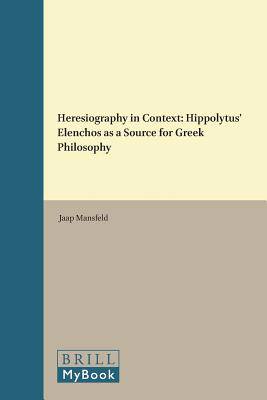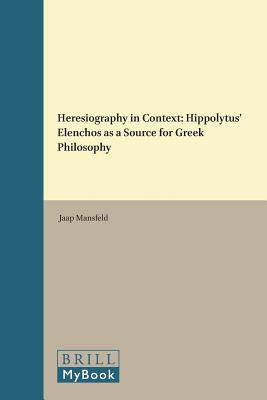
- Afhalen na 1 uur in een winkel met voorraad
- Gratis thuislevering in België vanaf € 30
- Ruim aanbod met 7 miljoen producten
- Afhalen na 1 uur in een winkel met voorraad
- Gratis thuislevering in België vanaf € 30
- Ruim aanbod met 7 miljoen producten
Zoeken
€ 460,95
+ 921 punten
Omschrijving
The study of the Elenchos (c. 225 CE) involves the whole range of ancient interpretative traditions concerned with Greek Philosophy, from Aristotle to the Late Neoplatonists. The present inquiry places Hippolytus' important reports about the Greek philosophers in the context of these traditions and so is able to illuminate not only what he has to offer but also to increase our knowledge of the traditions he depends on. For him the Pythagoreanizing current in Pre-Neoplatonism is of paramount importance. Accordingly, he constructs a succession (diadoche) starting with Pythagoras and including Empedocles, Heraclitus, Plato, Aristotle and the Stoics, and argues that the diadoche of the Gnostic heresiarchs is parasitical on its Pythagorean predecessor.
A new assessment of the sources used -- the first serious attempt since that of Diels in 1879 -- hinges on an analysis of Hippolytus' method of presentation, which is a blend of cento and exegesis geared to his anti-Gnostic purpose.
A new assessment of the sources used -- the first serious attempt since that of Diels in 1879 -- hinges on an analysis of Hippolytus' method of presentation, which is a blend of cento and exegesis geared to his anti-Gnostic purpose.
Specificaties
Betrokkenen
- Auteur(s):
- Uitgeverij:
Inhoud
- Aantal bladzijden:
- 412
- Taal:
- Engels
- Reeks:
- Reeksnummer:
- nr. 56
Eigenschappen
- Productcode (EAN):
- 9789004096165
- Verschijningsdatum:
- 1/03/1992
- Uitvoering:
- Hardcover
- Formaat:
- Genaaid
- Afmetingen:
- 163 mm x 245 mm
- Gewicht:
- 852 g

Alleen bij Standaard Boekhandel
+ 921 punten op je klantenkaart van Standaard Boekhandel
Beoordelingen
We publiceren alleen reviews die voldoen aan de voorwaarden voor reviews. Bekijk onze voorwaarden voor reviews.











